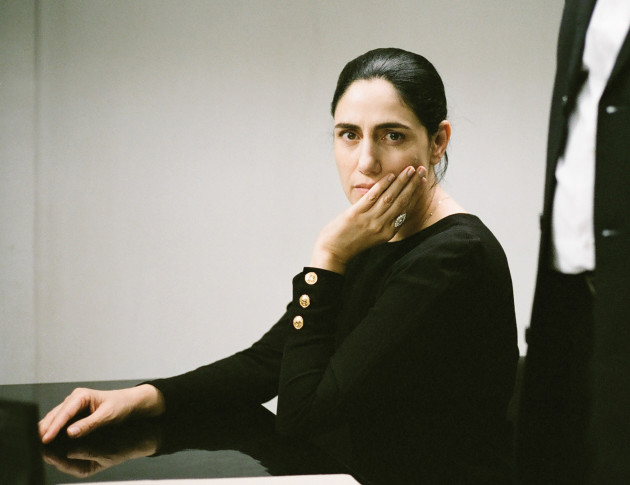
by admin
Shiva for Film Force Ronit Elkabetz

Ronit Elkabetz, Israeli film star, writer and director in her last film, “Gett: The Trial of Viviane Amsalem.”
Ronit Elkabetz is gone.
The Israeli film star, writer and director is dead at 51, from cancer that she concealed till the end. Following her death on April 19, her body lay in state at the Tel Aviv Cinamatheque, a showcase for independent and controversial film.
In what turned out to be her final film, just last year Americans saw Elkabetz as the long-suffering wife in “Gett: The Trial of Viviane Amsalem.” The grinding depiction of a woman’s years-long struggle against her unyielding husband and an Israeli religious court to obtain a gett, a writ of divorce, was the final film in the trilogy starring Elkabetz as Viviane Amsalem. Loosely based on the unhappy marriage of her Moroccan-born parents, Elkabetz co-wrote and co-directed the trilogy with her brother Shlomi, starting with “To Take a Wife” in 2004, then “Shiva” in 2008. The sister-brother collaboration was intense. As she described writing “Gett,” they’d hole up in a hotel room, cut off from the world, and create the film. On the set, they were in total sync.
“Gett,” Israel’s 2015 Oscar entry for best foreign-language film, ignited major protests in Israel, where civil marriage and civil divorce do not exist.
As Elkabetz told the Israeli newspaper Maariv back in 2010, “I am not here to get pleasure from acting. As much as it may sound bombastic, I would like to make a change.”
Elkabetz was seriously ill when she appeared at the Cannes Film Festival with “Gett” in 2014. When I interviewed her in New York on a snowy February day in 2015, she was elegant and subdued, letting her younger brother take the lead.
In retrospect, the crushing white walls of the courtroom created for “Gett,” with its life-killing authorities looking down in judgment, might well have been Elkabetz’s hospital room. Who knew the depths beneath her expression of suffering. As she told the Israeli newspaper Haaretz back in 2001, “I’ll never be able to act a role of a regular woman. The first thing I am looking for in an image is her pain. Only pain talks to me.”
That was the year major recognition first came to Elkabetz for “Late Marriage,” Dover Kosashvili’s film of a Moroccan Israeli divorcée whose relationship with a Georgian Israeli is destroyed by his family. Over 25 years, many of her wide spectrum of roles broke ground in depicting Israel’s Mizrachi (Jews from Arab countries) women. A rare light-hearted role was in Eran Kolirin’s “The Band’s Visit,” the 2007 comedy with political overtones. Elkabetz starred as the cafe owner in a desolate Negev desert town who befriends the Egyptian police band mistakenly arriving there on tour.
In private life, she was active in Achoti (Sister), the Mizrachi feminist organization. She went from volunteer to president. Known for her spectacular dress at the Ophir Awards (Israel’s Oscars), her contribution of clothing to Achoti fundraising helped finance pioneering programs for economically disadvantaged women.
With a career starring in Israeli and French films, openings in Cannes and Venice Film Festivals, and three Ophir awards, Elkabetz was seemingly unstoppable. In 2010, she married architect Avner Yasharon. Two years later, at the age of 47, she gave birth to a daughter and son. When she was being treated for cancer at Ichilov Hospital in Tel Aviv, she insisted on being moved to another hospital, not wanting to die where she had given birth.